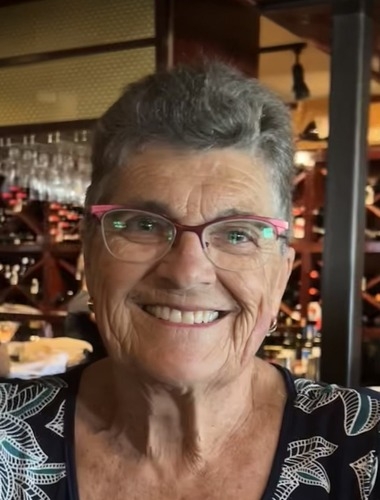
Last days of Monkey Around Playground before rebuild
Three decades of Concord children grew up racing beneath the rainbow cupolas and wooden bridges of Monkey Around Playground. On Tuesday night, they said a final farewell to White Park’s play space — then celebrated the new, accessible structure set to take its place.

Riverbend to close adult mental health housing facility in Concord due to funding challenges
Riverbend Community Mental Health has announced it will close its adult residential housing on Fayette Street in Concord this fall, as ongoing state and federal funding shortfalls put pressure on its programs.
Most Read
 Riverbend to close adult mental health housing facility in Concord due to funding challenges
Riverbend to close adult mental health housing facility in Concord due to funding challenges
 One person trapped, killed in Manchester Street fire
One person trapped, killed in Manchester Street fire
 Surplus seller Ollie’s enters New Hampshire, opens in Belmont
Surplus seller Ollie’s enters New Hampshire, opens in Belmont
 Concord All-Star U-13 Little League baseball to play in East Regional Tournament in Delaware
Concord All-Star U-13 Little League baseball to play in East Regional Tournament in Delaware
 Massachusetts man faces DWI charges after crash on I-93 in Hooksett
Massachusetts man faces DWI charges after crash on I-93 in Hooksett
 Ayotte vetoes bathroom bill, defeating it for second time in two years
Ayotte vetoes bathroom bill, defeating it for second time in two years
Editors Picks
 A Webster property was sold for unpaid taxes in 2021. Now, the former owner wants his money back
A Webster property was sold for unpaid taxes in 2021. Now, the former owner wants his money back
 Report to Readers: Your support helps us produce impactful reporting
Report to Readers: Your support helps us produce impactful reporting
 City prepares to clear, clean longstanding encampments in Healy Park
City prepares to clear, clean longstanding encampments in Healy Park
 Productive or poisonous? Yearslong clubhouse fight ends with council approval
Productive or poisonous? Yearslong clubhouse fight ends with council approval
Sports

Concord National LL Softball wins State Championship and moves on to Little League Regional Tournament
The Concord National Youth Softball 12U All-Stars team booked a trip down to Bristol, Conn., to represent New Hampshire in the Little League New England Region Tournament for the second year in a row with a win over Mount Monadnock on Saturday, 13-3.
 Josiah Hakala of Beaver Meadow wins State Amateur golf championship
Josiah Hakala of Beaver Meadow wins State Amateur golf championship
 Athlete of the Week: Grace Saysaw, Concord High School
Athlete of the Week: Grace Saysaw, Concord High School
 Local golfers tee off at 122nd Amateur Championship
Local golfers tee off at 122nd Amateur Championship
Opinion

Opinion: Trumpism in a dying democracy
 Opinion: What Coolidge’s century-old decision can teach us today
Opinion: What Coolidge’s century-old decision can teach us today
 Opinion: The art of diplomacy
Opinion: The art of diplomacy
 Opinion: After Roe: Three years of resistance, care and community
Opinion: After Roe: Three years of resistance, care and community
 Opinion: Iran and Gaza: A U.S. foreign policy of barbarism
Opinion: Iran and Gaza: A U.S. foreign policy of barbarism

Your Daily Puzzles

An approachable redesign to a classic. Explore our "hints."

A quick daily flip. Finally, someone cracked the code on digital jigsaw puzzles.

Chess but with chaos: Every day is a unique, wacky board.

Word search but as a strategy game. Clearing the board feels really good.

Align the letters in just the right way to spell a word. And then more words.
Politics

New Hampshire school phone ban could be among strictest in the country
When Gov. Kelly Ayotte called on the state legislature to pass a school phone ban in January, the pivotal question wasn’t whether the widely popular policy would pass but how far it would go.
 Sununu decides he won’t run for Senate despite praise from Trump
Sununu decides he won’t run for Senate despite praise from Trump
Arts & Life

Henniker Blues, Brews & BBQ Fest returns for fourth year
Feeling the summer spirit, Henniker will host its fourth annual BB&B Fest — Blues, Brews & BBQ — on the green in the shade of the Angela Robinson Bandstand, located at Community Park. The festival, sponsored by Pats Peak, will take place on Tuesday, July 22 at 6:00 p.m.
 Artist Spotlight: Holly Emrick
Artist Spotlight: Holly Emrick
 Concert on the lawn coming to Pierce Manse
Concert on the lawn coming to Pierce Manse
Obituaries
 Albert L. Powers
Albert L. Powers
Carlisle, MA - Albert L. Powers, 86, passed away peacefully at home on Monday, July 14, 2025, surrounded by family. He was predeceased by his wife of 37 years, June Powers, and was the loving father of Holly Motasky (Jay) of Naugatuck, ... remainder of obit for Albert L. Powers
 Lisa M. Hochberg
Lisa M. Hochberg
Concord, NH - Lisa Marie (Huey) Hochberg passed away on Thursday July 10, 2025, in Concord, NH, surrounded by her family. Born on July 9, 1962, in Warren, PA, she was the daughter of John and Patricia (Brothers) Huey. Lisa had very... remainder of obit for Lisa M. Hochberg
 Sue Ann Ross
Sue Ann Ross
Chichester, NH - Sue Ann Ross, 75, of Chichester, passed away at home on July 14, 2025, after a lengthy battle with cancer, surrounded by her loving family. She was born on January 10, 1950, in Concord, NH, to her late parents Earl and ... remainder of obit for Sue Ann Ross
 Sharon Parmenter
Sharon Parmenter
Boscawen , NH - Sharon A. Parmenter, 78, of Boscawen, passed away with family and friends by her bedside on the evening of July 2, 2025 at Concord Hospital. Sharon was born in Plymouth, NH on December 19, 1946, the first daughter to... remainder of obit for Sharon Parmenter


 PHOTOS: ‘Small voices’ gather at 50501 rally
PHOTOS: ‘Small voices’ gather at 50501 rally
 Bow Brook Tennis Club hosts men’s A and B tournaments
Bow Brook Tennis Club hosts men’s A and B tournaments
 Universal EFA enrollment set to hit 10,000-student cap
Universal EFA enrollment set to hit 10,000-student cap
 Community Players of Concord celebrate 97th season, prepare for 98th
Community Players of Concord celebrate 97th season, prepare for 98th
 Athlete of the Week: Dillan Abbate, Bow High School
Athlete of the Week: Dillan Abbate, Bow High School
 Chichester hires new town administrator after town hall turnover
Chichester hires new town administrator after town hall turnover

 Youngsters Richardson and Hakala move on, and veterans crash out at 122nd State Amateur Championship
Youngsters Richardson and Hakala move on, and veterans crash out at 122nd State Amateur Championship Concord became a Housing Champion. Now, state lawmakers could eliminate the funding.
Concord became a Housing Champion. Now, state lawmakers could eliminate the funding. ‘A wild accusation’: House votes to nix Child Advocate after Rep. suggests legislative interference
‘A wild accusation’: House votes to nix Child Advocate after Rep. suggests legislative interference  Town elections offer preview of citizenship voting rules being considered nationwide
Town elections offer preview of citizenship voting rules being considered nationwide Nate Lavallee, July Young Professional of the Month: Stretching toward strength, self-care and Southern NH wellness
Nate Lavallee, July Young Professional of the Month: Stretching toward strength, self-care and Southern NH wellness Lavender haze: Purple fields bloom at Warner farm
Lavender haze: Purple fields bloom at Warner farm
